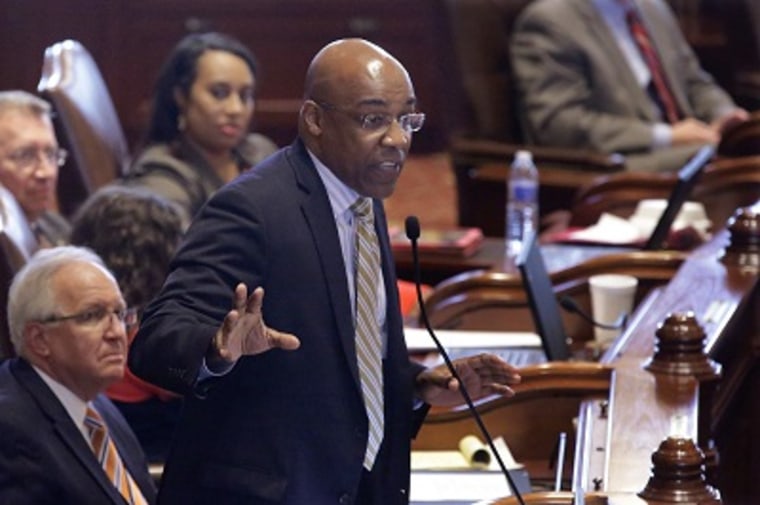Illinois adopted a new law Tuesday, becoming the last state in the country to allow public possession of concealed guns. Rushing to act before a federal court's deadline, state lawmakers finalized and passed a proposal strongly supported and backed by the National Rifle Association.
Democratic Governor Pat Quinn made changes to the bill over a month ago, but both chambers of the Illinois Legislature voted on Tuesday to override his veto, permitting some form of possession of guns in public. Gun control, already a difficult issue within the Illinois Democratic party, became even more divisive after the Newtown shooting last December.
Some lawmakers from urban jurisdictions like Chicago voted against the concealed carry law, fearing it would lead to even more gun violence. The city has struggled to bring down the rate of murders and shootings, but over the 4th of July holiday weekend, at least 60 people were shot and 12 were killed in Chicago. Over Father's Day Weekend, more than 40 people were shot and seven were killed by gun violence.
Tuesday's passage was a significant victory for the NRA, after Congress failed to pass a bipartisan bill that would have strengthened background checks for all commercial gun purchases. Although President Obama continues his pledge to pressure Congress to pass stricter gun legislation, the state where he served as a senator voted to expand gun rights.
The Senate voted 41-17 to override the governor's veto after the House voted 77-31. Under the new law, state police can issue permits to carry concealed guns to applicants who possess a Firearm Owner's Identification card after passing a background check and undergoing 16 hours of required firearms training. The permits cost $150. The law will not allow citizens to carry guns in public places such as bars, schools, libraries, parks, public transportation and hospitals.
State police would get six months to set up a system to process applications; police spokeswoman Monique Bond said the department expects 300,000 applicants in the first year.
Arguing that the bill would damage public safety, Gov. Quinn proposed several changes to the legislation such as prohibiting guns in restaurants that serve alcohol and limiting residents to carrying only one firearm at a time. Lawmakers considered some of Quinn's changes but overruled them in the end.
Last December, gun rights activists who lobbied hard for a concealed carry law brought the issue to federal court, and the 7th U.S. Circuit Court of Appeals ruled the Second Amendment allows citizens to carry guns in public. The federal court then gave the state until July 9 to enact a new gun law, prompting state lawmakers to act at the last minute to finalize a proposal. If the deadline had not been met, then the state would have had no law governing gun possession.
"If we do not vote to override today, at 12:01 a.m. tomorrow, July 10, there are no restrictions upon people who want to carry handguns in the public way," said Democratic Senator Kwame Raoul.
The negotiated law allows gun rights advocates the legislation they've advocated for and also allows gun control supporters the exceptions to where guns are deemed off limits. While there is a long list of public arenas where guns are not allowed publicly, the law allows residents to carry guns into restaurants and other establishments where liquor makes up no more than 50% of gross sales.
"If we didn’t pass anything, we’d have the Wild West," said Senate President John Cullerton, a Chicago Democrat.
"We already have in my district a Wild, Wild West," said another Chicago Democrat, Senator Jacqueline Collins, referring to the shootings that occurred last week.
